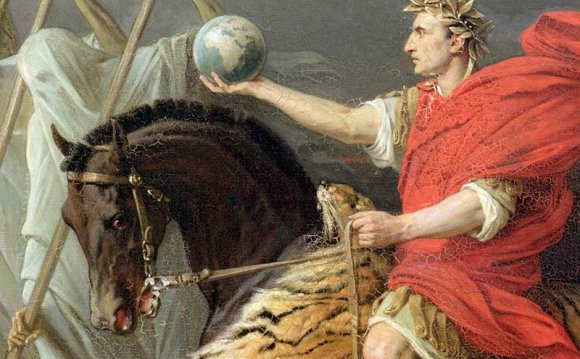
Rated 5 out of 5 by Zard Zard review of Famous Romans The reason that I really liked this course (admittedly I like all the courses) is that this gives you an up and close look at Roman history by looking at various key and famous Romans and not all of them are generals. Professor Rufus pulls from the writers of that time and does not go on about the validity of what they have written. He just pulls you into ancient Rome with their writings and muses on what the key Romans he has picked might have said or thought. His emphasis is not on the dates or events but on their feelings and thoughts. What you get with this course is the "feel" of ancient Rome. In essence, Professor Rufus is a story teller. A highly educated and well read storyteller. Do not take this course to learn about battles or great events. All of that is in his lectures. Take this course to get into the minds of these ancient Romans who made Rome what it was, one of the Greatest Empires to Exist. And by the way, the best of all his lectures are lectures 21 through 24. Lectures 21 and 22 are philosophical in nature and get you into the heart of Rome at its height during the empire. The 1st and 2nd centuries AD. The 23 lecture on key historians was totally fascinating and lecture 24 was totally surprising. I was exhausted after these four lectures (of course I replayed them all at least once before moving on and I re-watched lectures 21 three times before moving on). I am being purposely vague on these four lectures but if you like philosophy then you will like these lectures. This is definitely a "Must Watch" series if you want to learn about ancient Rome. I have just started my "walk about" of Roman history. I started with the "History of Rome" lectures, now "Famous Romans". Next I will watch "Emperors of Rome". This is turning out to be a great ride. November 28, 2014
Rated 5 out of 5 by MisterDarcy The Wisdom of the Romans In his lecturing, Professor J. Rufus Fears always had his eye on the big picture of history and the wisdom we can gain from a study of the past. While progressing chronologically through the history of ancient Rome, this lecture series is divided in three sections of biographical profiles that demonstrate important themes from Roman culture. The first part addresses the rise of the Roman Republic with focused discussion of significant generals. The most memorable of the lectures in this section considers the archenemy of Rome: the Carthaginian general Hannibal. Professor Fears analyzes both the military genius and the nobility of character of this larger-than-life figure. The nearly unlimited resources of Roman soldiers meant that Hannibal could not sustain an endless campaign in Italy. Hannibal’s Roman counterpart was the practically-minded Scipio Africanus, who took the war to Carthage, effectively driving Hannibal out of Italy. This was the turning point in the war. As recounted by the lecturer, Hannibal was conditioned from his childhood to dedicate his life to avenging the wrongs suffered by Carthage in the first Punic War. One of the lessons we can learn from a study of these two generals is that a war fought solely for revenge is doomed to failure. The second section addresses the period in Roman history leading up to the assassination of Julius Caesar and the fall of the Roman Republic. Two of the key Romans who emerge in these tumultuous years are Cato the Younger and Cicero. The lecturer makes a strong case for the influence of both of these Romans on the founding fathers of the American republic. A man of unbending principle, Cato refused to compromise to the new order represented by Julius Caesar. The values of republican Rome were so dear to Cato that he was willing to give his life for the preservation of the time-honored values implicit in the word respublica (“the people’s thing”). While Cato was the scion of one of Rome’s most famous families, Cicero was a “new man” who relied on his own intellect and charisma, as opposed to pedigree. But Cicero too felt a calling to oppose the rule of the generals, especially Mark Antony. One of the high points of the course is the lecturer’s detailed analysis of Cicero’s "De Officiis" (On Moral Duty)—a treatise written as advice to his son. Cicero wanted to convey to his son that he could conduct himself with the highest moral standards and still get ahead in life. Those words of wisdom should have been heeded by the self-serving generals who brought the Roman Republic to a tragic end. The final section of the series addresses the period of the Roman Empire. Here we meet the Stoic philosophers, including Epictetus and Marcus Aurelius. The lecturer offers wonderful insights into the essence of stoicism, which include a three-part model of how as individuals, we are capable of controlling our minds, our thoughts, and our actions. It becomes especially clear that the introspective Marcus Aurelius was better suited as a philosopher than he was as a Roman emperor. Arguably, after his reign, Rome was never the same. This compact series of lectures is successful in combining a broad outline of the history of Rome with the great lives, as recounted by Plutarch. A Greek writer at the court of two Roman emperors (Trajan and Hadrian), Plutarch sought to evoke a moral compass from which we can gain insights from the biographies. In probing the details of the lives of famous Romans, this course explores a commodity that, unfortunately, is all too rare today: wisdom. COURSE GRADE: A January 12, 2014
Rated 2 out of 5 by jms333 Less drama, more actual history Professor Fears is undoubtedly a learned man in his field, but alas his delivery is annoyingly dramatic - no doubt as a way to appeal to college students in Oklahoma who have little actual sense of history and need to be entertained. My main objection is his dramatized readings of dialogue that certainly has basis in history, but is actually fictionalized well beyond the source material. I value the Great Courses for their sophisticated scholarship in actual history, and Fears's course is more on the lines of one of those History Channel reenactments. Also, he might take into consideration that "cavalry" is not pronounced "Calvary." January 29, 2016
RELATED VIDEO












